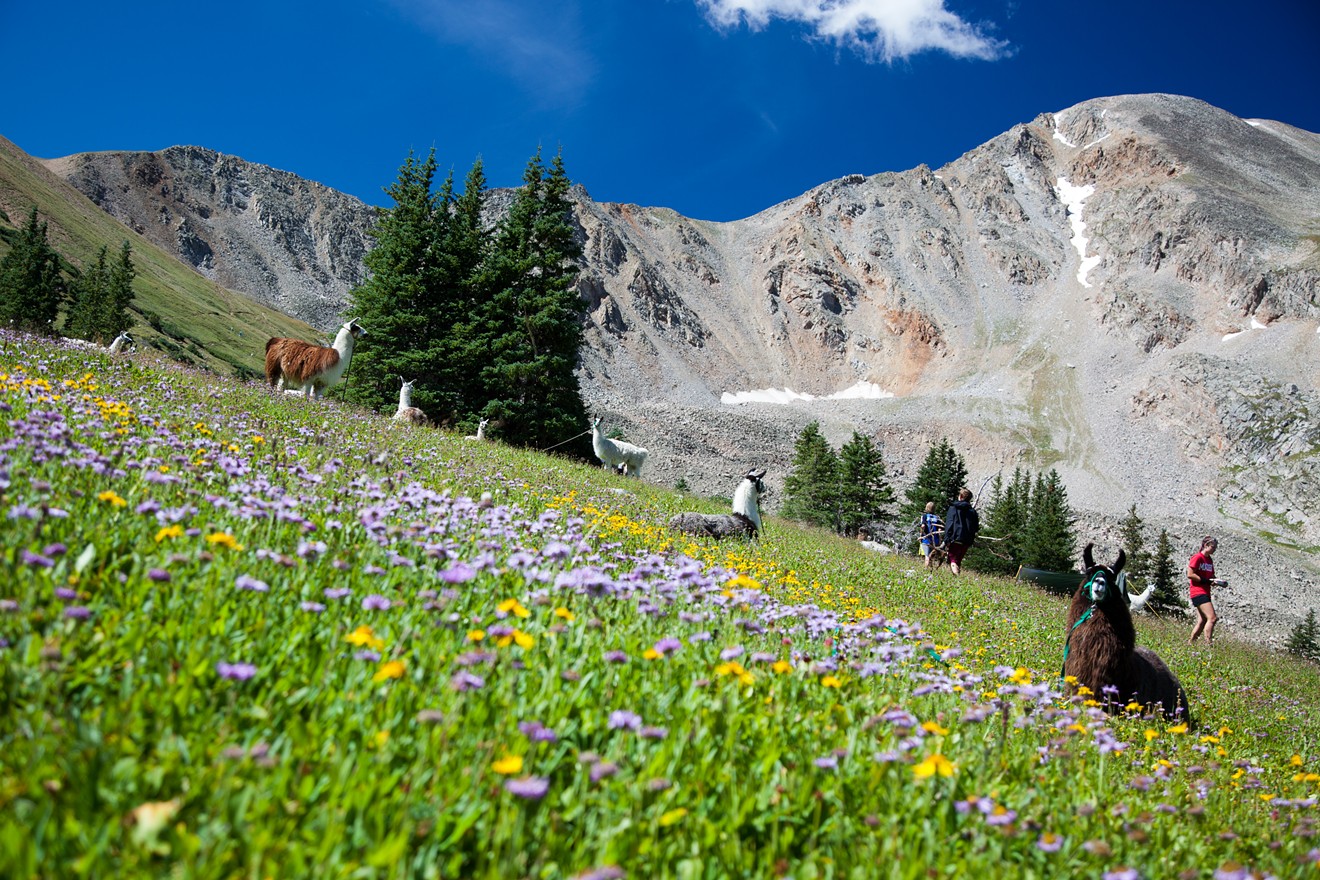There are many unsung heroes behind the legendary Leadville Trail 100, the annual hundred-mile endurance run dubbed the "Race Across the Sky." Earlier this summer, a small crew of workers had to clear as much as seven feet of snow off the trail — with nothing more than hand shovels –– in advance of the first events in the series leading to the August 19 grand finale. But the hard work isn't all preparatory: Integral to keeping the runners on their feet are the aid stations strewn along the course — none at an elevation lower than 9,200 feet.
Vicky Foster, who has been working at the Hope Pass Aid Station since 1987, calls her team the "Hopeless Crew." Every year, about a week before the Leadville Trail 100, Foster and her volunteers start assembling around 3,000 pounds of gear that they then haul up to the station that sits just below 12,500 feet in high alpine terrain. They camp there during race weekend, then spend another week cleaning up. But they have some help: about twenty llamas.
"They are good on the trail," explains Foster, who says that llamas are also gentle on the environment because of their soft-padded feet, as opposed to a horse's hard hooves. Foster owns a small llama farm that houses rescued females. She started it in 1987, the same year she got involved with the Leadville Trail 100.
"We were a sort of renegade station at first," Foster recalls. In fact, because it was so difficult to access, race organizers didn't officially recognize the Hope Pass station for a few years. In the beginning, the crew had only a few tarps for protection, and their aid for runners was mainly limited to providing filtered water. But as the station grew and became an official outpost, so did its services: Today it provides nearly 800 gallons of filtered water annually and boasts fully equipped cook and medical tents.
The crew has grown as well, from the original few to a group of about ten to twelve regulars and at least that many volunteers. A team of high-schoolers from Golden usually helps run water on the Saturday of the race. And for the past fourteen years, Foster has been joined by llama farmer Gary Carlton, her "partner-in-crime."
"The Hopeless crew is a natural team," she says. "There are many people from diverse backgrounds and philosophies." For example, Carlton is a hunter while Foster is a vegetarian —- but they're close friends, and Foster believes that the differences among crew members are what make their teamwork so inspiring.
"There is an understanding that we go up to contribute and to have fun together," she explains. "We work our buns off before and after the race, and pull off the station to tell other runners we care about them."
Foster, who used to be a runner herself, gets just as much satisfaction from manning the station, where she always faces unexpected challenges."You never know what the weather will do," she says. "I've seen rain, snow, sleet, hail and heat all in one weekend." And then there are the medical emergencies: One race, Foster had to cut a ring off of a competitor's finger that was swollen from the altitude.
And runners appreciate their dedication. Once, a competitor made it all the way to the station with a fifth of Bulleit Bourbon, which he handed off to Carlton. Another time, a runner sat down and drank a beer with the crew before continuing on his way.
This year will be Foster's thirtieth, and last, at the Hope Pass Aid Station. "It's been a nice run, but it's time for other focuses," she says, though she says she'll always be available to help the crew.
"We're on this world to leave it a better place," she concludes. "I hope to leave the pass a better place than I found it."
[
{
"name": "Air - MediumRectangle - Inline Content - Mobile Display Size",
"component": "12017618",
"insertPoint": "2",
"requiredCountToDisplay": "2"
},{
"name": "Editor Picks",
"component": "17242653",
"insertPoint": "4",
"requiredCountToDisplay": "1"
},{
"name": "Inline Links",
"component": "18838239",
"insertPoint": "8th",
"startingPoint": 8,
"requiredCountToDisplay": "7",
"maxInsertions": 25
},{
"name": "Air - MediumRectangle - Combo - Inline Content",
"component": "17261320",
"insertPoint": "8th",
"startingPoint": 8,
"requiredCountToDisplay": "7",
"maxInsertions": 25
},{
"name": "Inline Links",
"component": "18838239",
"insertPoint": "8th",
"startingPoint": 12,
"requiredCountToDisplay": "11",
"maxInsertions": 25
},{
"name": "Air - Leaderboard Tower - Combo - Inline Content",
"component": "17261321",
"insertPoint": "8th",
"startingPoint": 12,
"requiredCountToDisplay": "11",
"maxInsertions": 25
}
]














